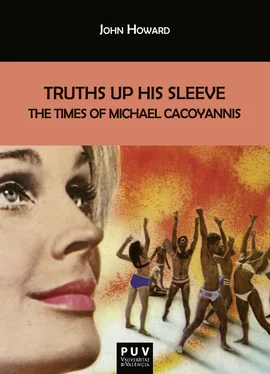The siblings’ tight bonds, in extreme, take on the qualities of xenophobia. “Whenever their private world was threatened by some unfamiliar intrusion, the clan feeling swept away their antagonism, plunging them into a wordless conspiracy.” Leslie is the victim of just such a conspiracy, what he calls their “ferocious solidarity,” as verbal disputes escalate to scuffles, with brawler Yannoulla “punching [Leslie] wildly on the chest,” unafraid of the older taller boy. The story suggests foremost that in 1930s cosmopolitan Cyprus, race, gender, and sexual politics were learned from the youngest ages. Children understood and participated in discourses of “inferior” African ancestry, as well as bastardy— though in the end, Leslie is proven “legitimate.” The touring Egyptian opera singer is discovered not to be Leslie’s biological mother but rather his stepmother. As author Michael ultimately generates sympathy for the boy left behind over the holidays, we learn that his birth mother too was an outcast, a victim of prejudice. Two years after Leslie’s birth, “his mother ran away with someone she shouldn’t have fallen in love with,” but the gender of her lover is left unspecified. Stella speculates it was a “close friend,” suggesting the early twentieth century “crushes” and “smashes” of young lesbian women, whereas adolescent Michael says it might have been “her husband’s brother”—reminiscent of legendary Salome’s mother. Moreover the birth mother’s racial identity is left undisclosed, mutable, and so even queerer. At the story’s conclusion, Leslie goes off to live with this birth mother who has finally located her lost son, inspiring jealousy in Michael. The mother charts a new life path as an unattached professional. She “never got married again and … built up a successful model-agency in London,” a place where Michael dreamed of settling. 26
Circulated among family members much later in life, the “Exterminating Leslie” manuscript reminded the Cacoyannis siblings of their childhood selves, their young familial alliances, and their participation in combative discourses that exoticized and stigmatized racial others. With decades of hindsight, Michael may have crafted his story’s siblings with the attributes of their adulthood, or perhaps his autobiographical short story accentuated well-remembered traits—such as evaluating gifts of gold jewelry—that proved consistent over his brother and sisters’ lifetimes. The story’s limited circulation suggests Michael may have never submitted it to publishers, but was willing to test the truth of its claims with its subjects, his siblings. As they perhaps concurred, at that early stage in life, Stella was their ethical compass; Michael a smart, sensitive, cunning boy; Yannoulla an avaricious fighter; George a charming beloved baby brother.
In time, as the father’s restrictions on his teenage children tightened, Michael would become willful, disobedient, and defiant. As Sara Ahmed suggests, “Feminist, queer, and antiracist histories can be thought of as histories of those who are willing to be willful.” Though not yet prepared to turn willfulness into radical statements of “self-description,” Michael Cacoyannis was reaching the threshold of “willfulness as standing against, willfulness as creativity,” especially when cultivated and encouraged by women flouting patriarchal norms. 27
Stella’s Sisterhood
The Cacoyannis family courted middle-class respectability, with limited financial resources often lost to gambling. Mother’s bridge parties cost a pretty penny, but father’s work-hard-play-hard regimen of lawyering, politicking, gaming, and carousing cost much more. Frustrations sometimes were vented at home, where corporal punishment was the norm. When curious inquisitive Stella and Michael “drove her beyond endurance, [Angeliki] would not only raise her voice but also … her bare hand which she used quite regularly on our buttocks,” sometimes faces. Father was worse. Though he sometimes spared his favorite Stella, the “die-hard conservative … could be very severe with his children.” As she remembered, “his authoritarianism was not confined to his chambers.” In her most candid moments, Stella acknowledged her father was “blunt,” “unyielding and obstinate,” “harsh and disagreeable.” A brute homophobe, he bristled at Michael’s fey ways and punished him for them. Stella further hinted their father physically abused their mother, almost “acquir[ing] the reputation of wife-beater.” Or, as Stella demurred: Was it just a “vivid dream”—or nightmare—of childhood? 28
By contrast, grandmother “Zoe did not rule her household with a rod of iron.” Later joined by Yannoulla and George, Stella and Michael often “walked out of the [parental] house in mass protest” against slapping, spanking, and belting, instead finding a “peaceful atmosphere” at Zoe’s home. Zoe was “courteous, dignified, and never lost her temper.” Moreover, she was “proud and independent, refusing to … live with us” lest she “be a burden.” Most of all, unlike their frightfully religious paternal grandmother, who warned “of the fires of hell,” maternal grandmother Zoe “was broadminded and liberal,” disinclined to “locked doors and lectures on morality.” Three unmarried daughters didn’t inspire panic in widow Zoe. “Old maid” Dryas and twins Cleo and Athena “were free to come and go as they pleased,” with Zoe “only accompanying them to formal functions and dances when a chaperone was essential.” All told, the four women managed their household just fine on their own, without men. Their home became a refuge for the Cacoyannis children. 29
Along with silent film intertitles, Stella and Michael “inherited [their] love of reading” from Zoe. “There were no forbidden books.” In fact, Zoe encouraged discussions of “daring literature.” So reading too was both refuge and resource, a way out, a means of looking and learning beyond locality, questioning received wisdom. Stella noticed the profound impact on Michael. As an infant, her brother had been “by all accounts very ugly.” Thus Angelika’s friends “teased [her] mercilessly.” Though Angeliki must have regretted her choice of friends, she nonetheless “secretly wept over” young Michael’s unsightliness. Ridiculed as an ugly ducking, Michael initially “was a very quiet boy. His favorite pastime was to hide behind a book, reading and sucking his left thumb while passing and re-passing his forelock between the index and middle finger of his right hand.” Fortunately for Michael, “his looks” improved, and he became an “outgoing and sociable” child, thanks in large measure to his maternal grandmother, mother, aunts, and sister Stella. 30
As liberating and enlightening as Zoe’s house were the summer cottages of Platres. “At Platres,” Stella recalled, children “were truly free. The whole mountain was ours. There was no traffic and no crime, and our parents did not worry about us.” That is, mothers did not worry. Fathers tended to stay in the city for work and pleasure, joining their families only at weekends. Meantime middle-class women and children enjoyed their autonomy. During the “memorable summer” of 1933, Angeliki’s cousin, soprano Calliope de Castan came to Platres from Vienna, her reputation as a “modern woman” preceding her. “This we interpreted as meaning that she had lovers.” One night, Stella and Michael “could not sleep for the noise in the sitting room.” They “crept out of bed and looked. Calliope was singing [Mascagni’s] Cavalleria Rusticana , dancing and shedding her clothes, until she finally stood utterly naked before her audience” of women, as it was midweek. Free spirit Calliope “sung all her songs” to Stella and Michael “on walks in the woods of Platres, vividly relating the stories of the operas, explaining the techniques of breathing and teaching us how to bring out the various sounds. Michael showed exceptional aptitude” for singing, as well as dancing. 31
Читать дальше











